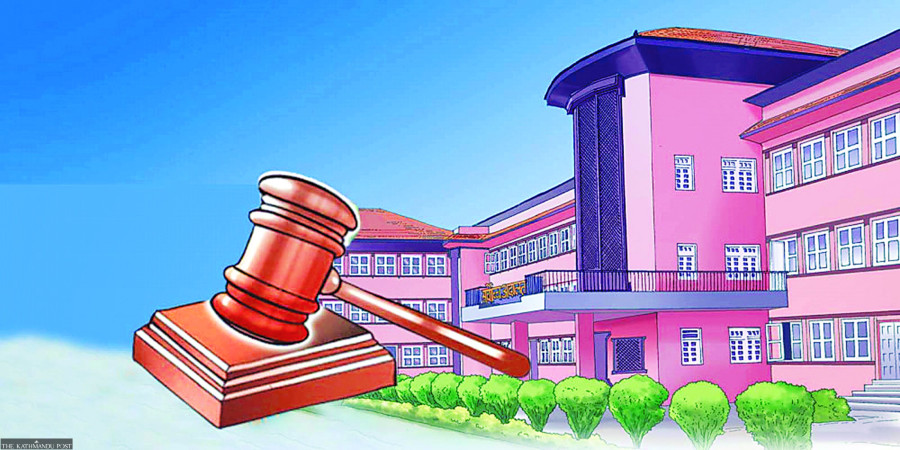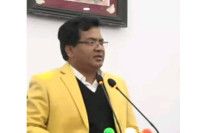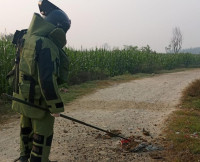National
Top court orders law amendments before next polls to ensure constitutional spirit of inclusiveness
‘Nepal should also follow the criteria of narrowly tailored proportionality like in other countries while giving opportunity to the deprived community.’
Purushottam Poudel
The Supreme Court has ordered the government, the federal parliament and other relevant authorities to review the laws governing elections at all levels to make them inclusive as per the letter and spirit of the constitution before the next periodic polls.
The top court asked the authorities to make changes in the election-related laws, ruling that it was necessary to elect lawmakers and representatives at other levels as per the right to proportional representation in accordance with the constitution.
“In the context of Section 28 of the House of Representatives Election Act, 2017, accepting the principle of inclusion and in view of the provisions included in the preamble, in the fundamental rights and the overall arrangements made in the constitution with regard to the proportional representation, it has become desirable to make changes in the existing laws so as to implement the principle of inclusion,” the apex court said in the full text issued on Tuesday in a case filed by senior advocate Balkrishna Neupane on January 5, 2023.
The court explains that the true meaning of inclusion is to prevent capture of the elected bodies by the society’s elite.
“The main objective of the constitution, to establish an inclusive state, can be foiled if the people from the creamy layer of the society such as those from well-off background and those who are highly educated, those who repeatedly held parliamentary or ministerial berths and those having strong economic and social background hold the state’s elected positions,” reads the full text.
A five-member bench comprising Chief Justice Bishowambhar Prasad Shrestha, justices Ananda Mohan Bhattarai, Prakashman Singh Raut, Prakash Kumar Dhungana, and Sushmalata Mathema conducted the hearing and issued the verdict as well as the full text.
Senior advocate Neupane moved the Supreme Court seeking its intervention arguing that the proportional representation electoral system was misused by the political parties. He challenged the selection of lawmakers under the PR quota for the House of Representatives after the 2022 elections saying that it breached the constitution.
As many as 110 lawmakers in the 275-strong lower house were selected under the PR system based on the number of votes each party secured under the PR ballot. The remaining 165 were elected under the first-past-the-post system.
Neupane filed a petition making all the political parties and lawmakers elected under PR quota the defendants, to which the Supreme Court sought their answers.
The Supreme Court, which passed the verdict on March 13 after listening to the arguments from all the political parties and the PR-elected lawmakers, issued the full text of the order. Though Neupane in his petition demanded the annulment of those elected under the system, the five-member bench scrapped his petition.
The full text reads: “Article 84 (2) of the constitution incorporated PR in the electoral system for the purpose of proportional inclusion. The PR electoral system was envisioned with a view to giving the right to the country's deprived community, which the political parties breached while recommending them.”
The full text further states, “Nepal should also follow the criteria of narrowly tailored proportionality like other countries while giving opportunity to the deprived community.”
Likewise, the full text also mentions that Article 42 of the constitution gives the right to the socially backward women, Dalits, indigenous people, indigenous nationalities, Madheshis, Tharus, minorities, people with disabilities, marginalised communities, Muslims, backwards classes, gender and sexual minorities, youths, farmers, labourers, oppressed or citizens of backward regions and indigenous Khas-Arya members have the right to participate in state bodies on the basis of the inclusion principle.
“The opposition parties recommended PR and then, after being elected, breached the sentiment of Article 42 (1) of the constitution,” the full text reads. “The provision of PR was mentioned to uphold the constitutional spirit and execute it in Article 84 (2).”
The court verdict further says, “Though the constitution envisions representing those from deprived communities, who cannot make it to Parliament through open competition, the parties have been misusing the system to give an entry to those close to their leaders.”
Many names on the lists of lawmakers elected under this category suggest the parties are abusing the system. Several leaders have had multiple opportunities not just in Parliament but also in the Cabinet.
The People's Movement introduced the idea of proportional representation in 2006, triggering a shift in the political system. The 2007 Interim Constitution formalised the representation of marginalised groups in political parties and state institutions. The proportional representation system was introduced from the Constituent Assembly election in 2008. In the 601-member assembly, 335 members were elected under the PR quota.
The second Constituent Assembly retained the same clause. Even if the percentage dropped after the constitution was promulgated, it institutionalised the provision.




 22.6°C Kathmandu
22.6°C Kathmandu















